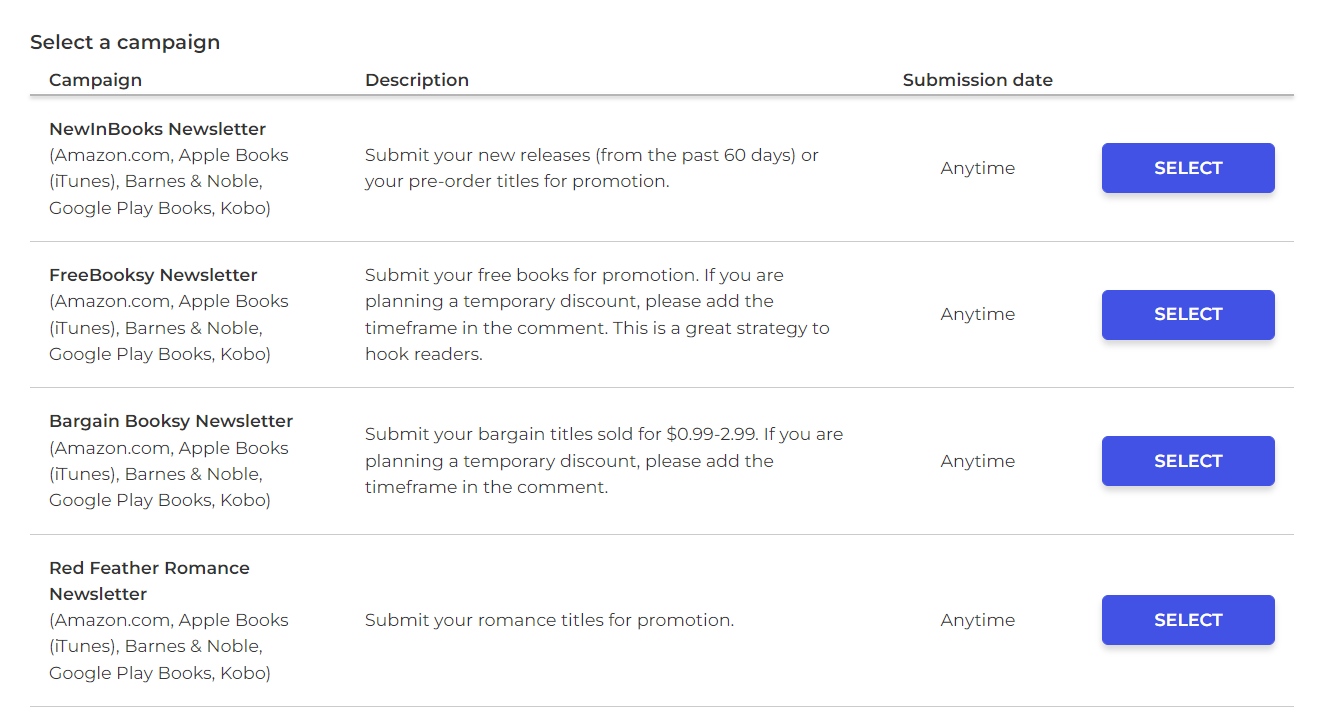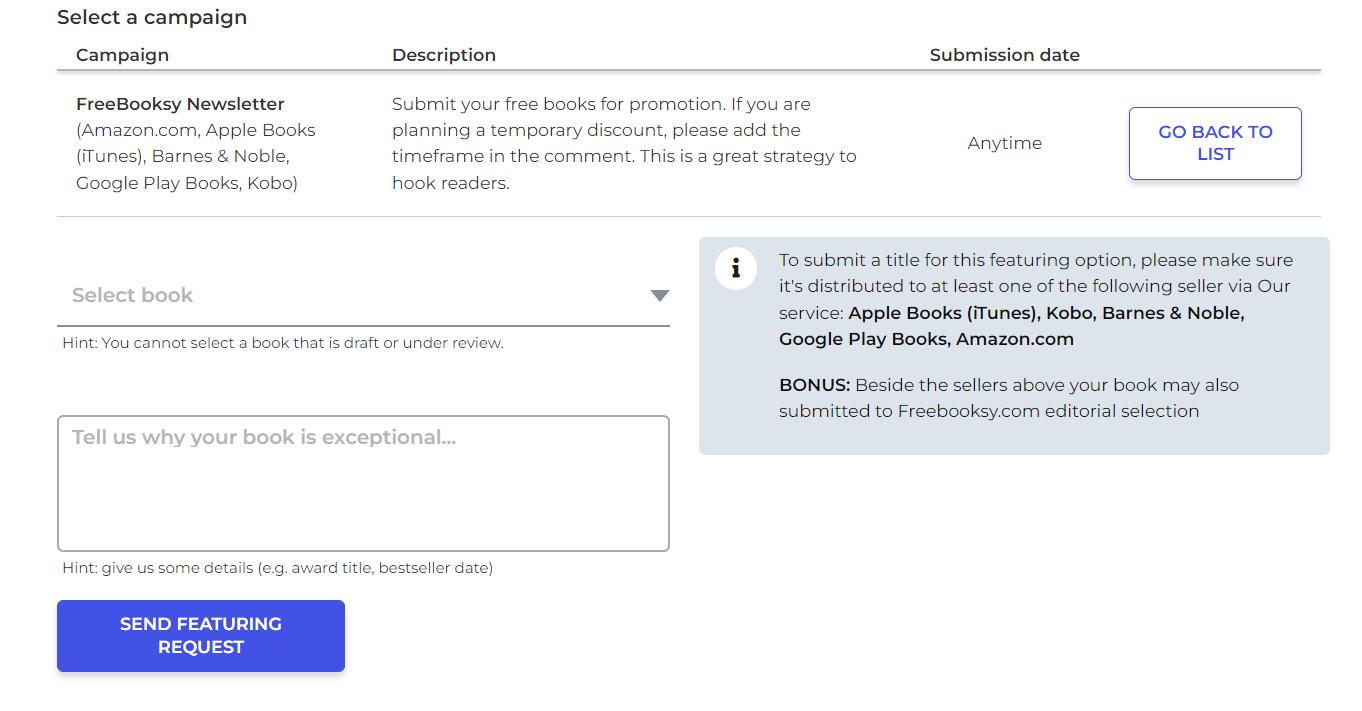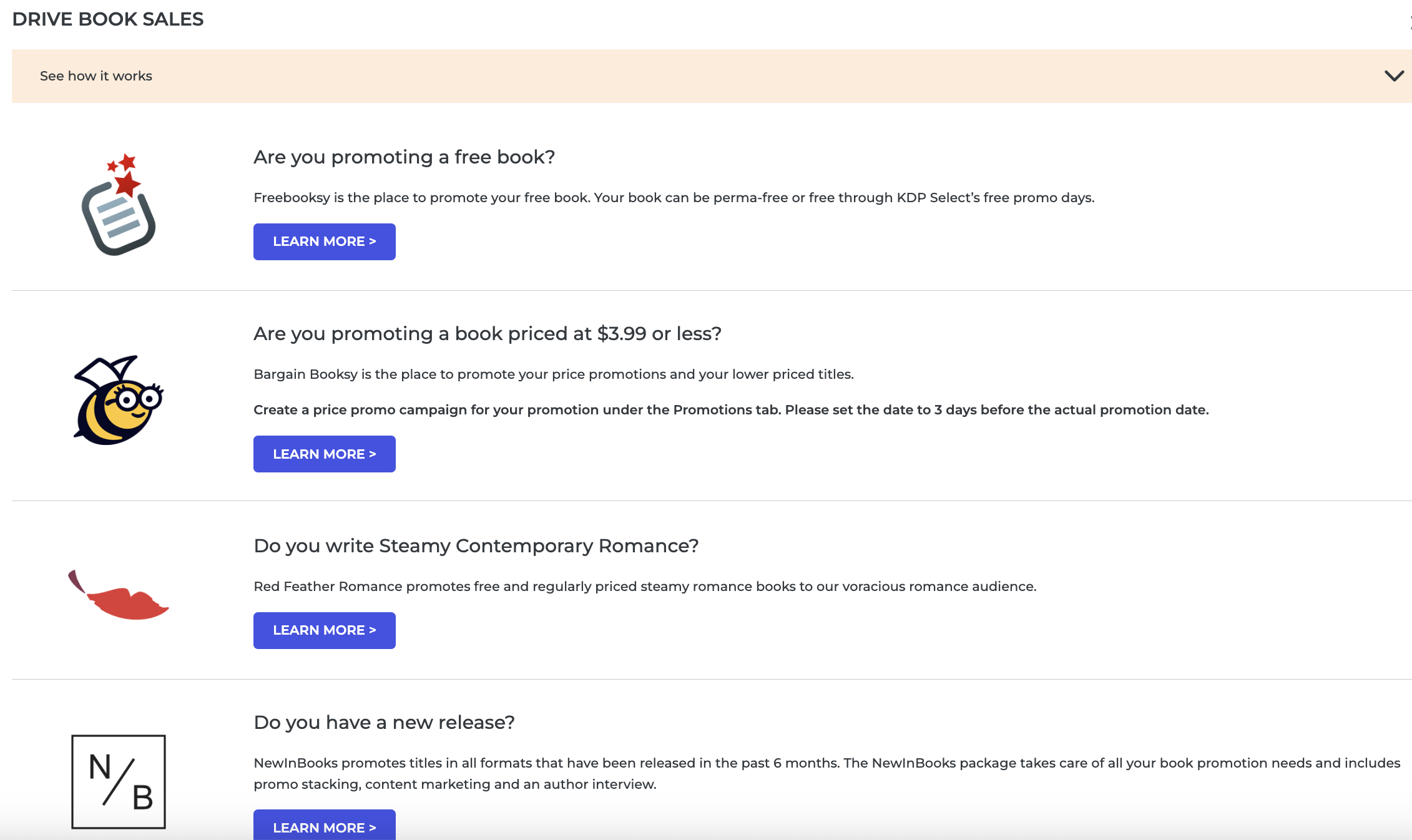Free and Paid Book Promotion Services to Check Out in 2024

Publishing your book(s) is not the final step of the process. You need to promote it to increase its discoverability and gain more readers.
You can do it through a well-defined book marketing timeline, which may include seeking out a few websites that offer free or paid book promotions.
Here's a list for you to get started.
Read about:
1. Free Book Promotion Services
This is a list of book promotion services where you can submit your book for free. Most of them also have paid promotion options if you want to get your book featured in more places.
Check their requirements when submitting your title. This is because most of them require your book to be on sale, sometimes heavily discounted or for free.
Armadillo eBooks is a free book promotion site that will place your promo book in front of its network and on promotional sites. They also have different types of paid promotions, such as Featured Promotions (which are book promotion packages), Daily Deal Promotions, Facebook PPC Campaigns, and Social Promotions.
Accepts: free and discounted books
Includes: Free listing
Optional: Paid promotion from $5
Awesome Gang is a free book promotion site that helps readers find your book through a reliable source. The awesome part is that they also have a paid book promotion option, so you can pay only $10 and have your book featured for two days on their homepage, newsletter, and social media channels.
Accepts: free and discounted books
Includes: Free listing
Optional: Paid promotion from $10
This is another great free book promotion site. With Best Book Monkey’s free option (Bronze Package), your book will get featured on their homepage, genre page, and social media, and you get the chance to win a Gold Package. The paid promotion includes everything from the Bronze Package, plus your book will get featured in their newsletter.
Accepts: free and discounted books
Includes: Free listing
Optional: Paid promotion; genre-specific pricing for books priced between $0.01 and $4.99 and $15 for free books, any genre
Enlisting your book on this ebook promotion service website is free (books are selected by quality and value). You can also opt for one of Book Bongo’s paid options – start with a Book Bump ($9.99) and get to Ultra Book Bonanza ($99.99) or Extreme Book Video Trailer ($199.99).
Accepts: free and discounted books
Includes: Free listing
Optional: Paid promotion from $9.99
The book promotion service Discount Book Man accepts book submissions for free. The website also has a paid book promotion, which ensures your book is displayed on their front page listing for 7 days, in their newsletter, and on social media pages.
Accepts: free and discounted books
Includes: Free listing
Optional: Paid promotion for $15
Authors can benefit from the free book promotion service offered by Free Book Tips. Make sure you adhere to their requests, and then submit your book and wait for their approval.
Accepts: free and discounted books
Includes: Free listing
This one's another free book promotion website service. If selected, your book will be featured for three days on their website and included in their newsletter. Check their requirements to increase your chances.
The paid package on It's Write Now guarantees your book being featured on their front page and social media accounts for 3 or 7 days (depending on the package you choose) and in their daily newsletter.
Accepts: free and discounted books
Includes: Free listing
Optional: Paid promotion from $10
On Pretty Hot Books, you can submit your Kindle book for free. They also have a paid promotion option, so you can have your title featured for 7 days on their front page, in their newsletter, and on social media channels.
Accepts: free and discounted books
Includes: Free listing
Optional: Paid promotion from $25
A free book submission on this book promotion service website will (possibly) place your book in front of over 29,000 readers for a limited time. Reading Deals’ paid book promotion option guarantees the listing and expands the exposure time.
Accepts: free and discounted books
Includes: Free listing
Optional: Paid promotion from $29
Snicks List is a service developed by a group of independent authors who understood the need for a book promotion website for indie authors. They’ll feature your title on their social media channels and in their newsletter.
Accepts: free and discounted books
Includes: Free listing
2. Paid Book Promotion Services
With these book promotion services websites, you won’t get a free listing. Every submission costs, but it will promote your book in front of many readers.
This book promotion service is for Mystery and Thriller books only. Submit your discounted book to Book Andrenaline, and if it gets selected, you’ll pay the required fee to get your book featured on their website, in their daily mail, and posted on their Facebook and Twitter page. Make sure to read their requirements to increase your chances of being selected.
Accepts: free and discounted books
Paid promotion from $20
Book Barbarian is a paid book promotion service for Sci-Fi & Fantasy books. If you consider this service, know that your book promotion will get featured in their newsletter, on their website, Facebook page, and in a Pinterest post. Make sure to read their requirements.
Accepts: free and discounted books
Paid promotion from $40
Book Cave is a book promotion service that works in two ways: 1) it sends and promotes the author's promo books to several retailers and 2) helps them gain more newsletter subscribers.
Accepts: free and discounted books
Paid promotion from $5
Book Dealio is an ebook deals newsletter that helps you bring your book promo in front of over 395,000 subscribers. Together with the book promo, you can add a link to your website or email newsletter sign-up form.
Accepts: free and discounted books
Paid promotion between $78-$125, based on category
Book Gorilla is a Kindle-friendly book promotion service for those seeking heavily discounted or free books. They include your books in their daily emails, which are tailored to the preferences of tens of thousands of opt-in subscribers.
Accepts: free and discounted books
Paid promotion between $40 and $50, based on category
With BookDoggy, your free or discounted ebook is promoted one time in their daily newsletter and Facebook ads. Besides this, you'll have your book promotion featured on their website, social media channels, and a video they’ll create for your book. They can also include links to the stores where you've distributed your books, such as Amazon (including Kindle Vella), Kobo, Apple, Barnes and Noble, Google, Smashwords, Bookfunnel, and Story Origin.
Accepts: free and discounted books
Paid promotion at $21 for free books; $24 for discounted books
Book Raid is a paid book promotion service that works a bit differently than the others. With this service, you will be featured in their newsletter (more than 40,000 readers), and you will pay only for the clicks you get, with a maximum of $60 per promotion.
Accepts: free and discounted books
Paid promotion: pay-per-click with a maximum of $60 per promotion
BookBub is among the best book promotion service websites (and it’s the most popular), with millions of readers ready to discover the next book promotion. The promotion costs are based on the book category, region, and discount price of the featured book.
Accepts: free and discounted books
Paid promotion from $104
If you want to submit your book to the book promotion service offered by Book Runes, your book must be priced at $2.99 or less. They will highlight your book promo in their newsletter and on their Facebook page so that others can find it faster.
Accepts: free and discounted books
Paid promotion from $25
Crave Books offers a variety of services tailored to different needs and budgets. They have featured promotions (which are book promotion packages), Facebook PPC campaigns, daily deal promotions, book blog promotions, and social promotions.
Accepts: free and discounted books
Paid promotion from $5
Dango Books is a book promotion service website that sends your book promo to thousands of email subscribers. You'll also be advertised on their website and social media channels and get a personalized graphic design for your book.
Accepts: free and discounted books
Paid promotion from $25
Early Bird Books is the leading email newsletter from Open Road. Open Road is the parent website for a few book promotion services: The Lineup for true crime, psychological suspense, and horror; The Portalist for science fiction and fantasy; Murder & Mayhem for crime fiction and thrillers; A Love So True for romance and relationships; and The Archive for history and non-fiction.
With the Early Bird Books Newsletter, you can reach up to 1.5 million readers interested in new titles or series from multiple genres.
Accepts: free and discounted books
Paid promotion $250
ENT places your book on the promotion list for thousands of readers to see. For this, you need to make sure your book is free or on sale and in top-quality shape.
Accepts: free and discounted books
Paid promotion from $40
Writer of hot romance? ExciteSteam is an ebook promotion service that can place your book promotion in front of readers seeking an exciting romance story. They will promote your book through their newsletter, website, and Facebook page.
Accepts: free and discounted books
Paid promotion from $15
If you have a book priced under $2.99, here’s one of the book promotion service websites you could advertise it on. Free and Discounted Books, as its name suggests, accepts bargain, free, and permafree books.
Accepts: free and discounted books
Paid promotion from $12
Hello Books is a Written Word Media promo partner. This book promotion website emails its readers every week to tell them about promo books. Yours included. Besides email, your book will appear in their Facebook advertising campaigns. All you need to do is have your book listed on Amazon and priced at $0.99 or free.
Accepts: free and discounted books
Paid promotion based on category; starts at $35
As Hot Zippy says, they specialize in affordable ads and promoting ebooks written by independent authors. It's true: you can get one of the best advertising for your book promo across four websites, audiences, and email newsletters.
Accepts: discounted books
Paid promotion from $24
With Lovely Book Promotions, you can get your free Kindle ebook listed on their website and social channels for a small fee. Besides this listing, you can also choose their book promotion package, which will get your book featured on their website for seven days, a permanent listing on their website, and promotion on their social media.
Accepts: free and discounted books
Paid promotion from $7
OHFB is for permafree, free for a limited time, or huge discounted books from Amazon. This book promotion service website will notify readers via newsletter about your Kindle book promotions. Your title will also be featured on their website and social media.
Accepts: free and discounted books
Paid promotion from $75
Red Rose Romance is the perfect paid book promotion website for Romance and Erotica titles. With over 40,000 email subscribers and 6,700 Facebook fans, your books will be placed in front of many readers of these genres. Make sure to read their requirements to get selected.
Accepts: free and discounted books
Paid promotion from $25
Robin Reads’s subscribers enjoy all book genres, from mystery and thriller to steamy romance. And they’re on the lookout for the next best book promo.
Accepts: free and discounted books
Paid promotion depends on category; starts at $40
The Fussy Librarian offers two newsletters: one for bargain ebooks (125,000 subscribers) and one for free ebooks (570,000 subscribers). If you want to promote your discounted book, they recommend you price it at 99 cents or $2.99.
Accepts: free and discounted books
Paid promotion depends on category; starts at $10
3. Get on Book Promotion Service Websites with PublishDrive
To have your book promotion featured on book promotion service websites, you first need to have your book published. Obviously.
What if you could publish and promote your book from the same place, to top book promotion services?
With PublishDrive, you can easily self-publish, distribute and market your book under one roof.
We partner with Written Word Media, where authors and publishers can run their book promo.
Written Word Media has multiple book promo sites with a significant amount of potential customers you can reach.
The best part is that you can have your book featured in their newsletter for free through PublishDrive.
💡Read more about book bargains with PublishDrive.
Here's what WWM offers:
What else:
- Their book launch Complete Package also includes a dedicated book launch specialist
- Professionally designed & targeted Facebook Ads ($75 value)
- Placement in Promotional Newsletters (Freebooksy, Bargain Booksy, Red
- Feather Romance, Audio Thicket)
- An exclusive author interview on NewInBooks
- A search-optimized listicle that includes your book
- Social promotion on NewInBooks Facebook & Instagram accounts
Free newsletter featuring through PublishDrive
Paid promotion book services
Freebooksy has over 519,000 registered readers. This deal is for you if you have titles that are permanently free or free for a limited time.
Free newsletter featuring through PublishDrive
Paid promotion book services
Bargain Booksy has over 365,000 registered users. If you’re planning a book promo, or if your book is already priced between $0.99 and $5, you can try this book promotion service to drive more sales.
Free newsletter featuring through PublishDrive
Writer of basically any kind of romance seeking more readers? Red Feather Romance is the place to advertise your book promotions.
Free newsletter featuring through PublishDrive
How to get featured by Written Word Media with PublishDrive
You can get featuring opportunities with any book promotion services from Written Word Media, depending on your book promo (free or discounted).
Here’s how:
1. From your dashboard, go to Promotions > Featuring.

2. Select the place you want your book to be featured. Before that, make sure your book is distributed to the stores mentioned on each book service website.

3. Select your book and add a description.

4. Wait for the submission approval. We’ll send you an email with the details.
Choose the paid book promotion services from Written Word Media via PublishDrive
Alternatively, you can opt for a paid book promotion from Written Word Media via PublishDrive. Access the Drive Book Sales tab from Promotions, and choose a book promotion service.

Conclusion
A website focused on book promotion services can significantly help you with your book sales. Given the number of subscribers to each newsletter I mentioned, more people can find out about your book each time you run a book promo.
If you wish to make the entire process easier, you can publish, distribute and promote your book with PublishDrive. Besides the featuring opportunities, you can do so much more to market your book.
Give it a try.
Here's an overview on how to market your book using PublishDrives's promotional tools:
It’s free to publish your 1st ebook on PublishDrive. Or try out a paid plan and get your money back if you’re not satisfied.